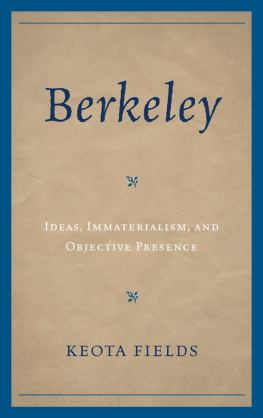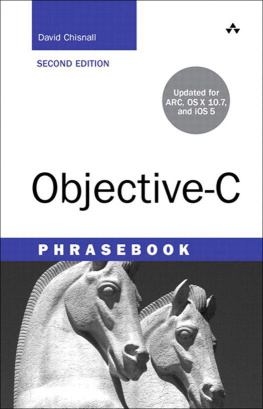Fields - Berkeley: ideas, immaterialism, and objective presence
Here you can read online Fields - Berkeley: ideas, immaterialism, and objective presence full text of the book (entire story) in english for free. Download pdf and epub, get meaning, cover and reviews about this ebook. year: 2010, publisher: Lexington Books, genre: Religion. Description of the work, (preface) as well as reviews are available. Best literature library LitArk.com created for fans of good reading and offers a wide selection of genres:
Romance novel
Science fiction
Adventure
Detective
Science
History
Home and family
Prose
Art
Politics
Computer
Non-fiction
Religion
Business
Children
Humor
Choose a favorite category and find really read worthwhile books. Enjoy immersion in the world of imagination, feel the emotions of the characters or learn something new for yourself, make an fascinating discovery.
Berkeley: ideas, immaterialism, and objective presence: summary, description and annotation
We offer to read an annotation, description, summary or preface (depends on what the author of the book "Berkeley: ideas, immaterialism, and objective presence" wrote himself). If you haven't found the necessary information about the book — write in the comments, we will try to find it.
Fields: author's other books
Who wrote Berkeley: ideas, immaterialism, and objective presence? Find out the surname, the name of the author of the book and a list of all author's works by series.
Berkeley: ideas, immaterialism, and objective presence — read online for free the complete book (whole text) full work
Below is the text of the book, divided by pages. System saving the place of the last page read, allows you to conveniently read the book "Berkeley: ideas, immaterialism, and objective presence" online for free, without having to search again every time where you left off. Put a bookmark, and you can go to the page where you finished reading at any time.
Font size:
Interval:
Bookmark:
Berkeley
Berkeley
Ideas, Immaterialism, and Objective Presence
Keota Fields

Lexington Books
A division of
Rowman & Littlefield Publishers, Inc.
Lanham Boulder New York Toronto Plymouth, UK
Published by Lexington Books
A division of Rowman & Littlefield Publishers, Inc.
A wholly owned subsidiary of The Rowman & Littlefield Publishing Group, Inc.
4501 Forbes Boulevard, Suite 200, Lanham, Maryland 20706
www.lexingtonbooks.com
Estover Road, Plymouth PL6 7PY, United Kingdom
Copyright 2011 by Lexington Books
All rights reserved . No part of this book may be reproduced in any form or by any electronic or mechanical means, including information storage and retrieval systems, without written permission from the publisher, except by a reviewer who may quote passages in a review.
British Library Cataloguing in Publication Information Available
Library of Congress Cataloging-in-Publication Data
Fields, Keota, 1974
Berkeley : ideas, immaterialism, and objective presence / Keota Fields.
p. cm.
Includes bibliographical references and index.
ISBN 978-0-7391-4295-0 (cloth : alk. paper) ISBN 978-0-7391-4297-4 (ebook)
1. Berkeley, George, 16851753. I. Title.
B1348.F54 2011
192dc22 2010052809
 The paper used in this publication meets the minimum requirements of
The paper used in this publication meets the minimum requirements of
American National Standard for Information SciencesPermanence of Paper
for Printed Library Materials, ANSI/NISO Z39.48-1992.
Printed in the United States of America
In memory of
Andre Marcus Williams
19552004
References to primary sources in the text use the following abbreviations:
Works by Antoine Arnauld
OA | Oeuvres Philosophiques dArnauld , 6 vols., ed. Elmar J. Kremer and Denis Moreau. (Bristol: Thoemmes Press). 2003. Cited by volume and page number. |
TFI | On True and False Ideas, New Objections to Descartes Meditations and Descartes Replies . Trans. Elmar J. Kremer. (Lewiston: Edwin Mellen Press). 1990. Cited by page number in vol. 38 of OA . |
PRL | A. Arnauld and P. Nicole. Logic, or The Art of Thinking , trans. Jill Vance Buroker. (Cambridge: Cambridge University Press). 1996. Cited by page number. |
Works by George Berkeley
Works | The Works of George Berkeley, Bishop of Cloyne , 9 vols. Ed. A. Luce and T. Jessop. (London: Thomas Nelson). 19481957. |
PC | Philosophical Commentaries in Works vol. 1. Cited by entry number. |
NTV | An Essay Towards a New Theory of Vision in Works , vol. 1. Cited by section number. |
PHK | A Treatise Concerning the Principles of Human Knowledge in Works , vol 2. Cited by section number. |
PHKI | Introduction to A Treatise Concerning the Principles of Human Knowledge , in Works , vol. 2. Cited by section number. |
DHP | Three Dialogues between Hylas and Philonous in Works , vol 2. Cited by page number. |
Alciphron | Alciphron, or the Minute Philosopher in Works , vol 3. Cited by page number. |
S | Siris in Works , vol 5. Cited by section number. |
Works by Ren Descartes
CSM(K) | The Philosophical Writings of Descartes , 3 vols., ed. and trans. J. Cottingham, R. Stoothoff, D. Murdoch, and A. Kenny. (Cambridge: Cambridge University Press). 19851991. Cited by volume and page number. |
Works by John Locke
Works | The Works of John Locke , 10 vols. (London: Tegg). 1823; reprint, (Aalen: Scientia). 1963. Cited by volume and page number. |
Essay | An Essay Concerning Human Understanding , ed. P. Nid |
Abrg | Abstract of the Essay in Peter King, Life and Letters of John Locke . (London: Henry G. Bohn). 1858, 36599. Cited by page number. |
Works by Nicolas Malebranche
ST | The Search After Truth , ed. and trans. T. Lennon and |
Elucidations | Elucidations of the Search After Truth in ST . Cited by Elucidation number and page number. |
OC | Oeuvres Compltes des Malebranche , 20 vols., ed. A. Robinet. (Paris: Vrin). 19581967. Cited by volume and page number. |
Works by Thomas Reid
Philosophical | Philosophical Works , 2 vols., ed. W. Hamilton. (Edinburgh: Maclachlan and Stewart). 1895. Cited by volume and page number. |
George Berkeley (16841753) notoriously argued that matter does not exist, and that what perceivers typically call the physical world consists entirely of minds and ideas. Some three hundred years after his systematic development of this claim was first published, Berkeleys philosophy is still met with bemusement and wonder. His immaterialism was a reaction to the corpuscularianism of his famous predecessor, John Locke, whose Essay Concerning Human Understanding (1689) had become required reading (along with works by Descartes, and Malebranche) by the time Berkeley entered Trinity College, Dublin, in 1700. Corpuscularianism offers causal explanations of natural phenomena in terms of unobservable elemental particlescorpuscleswhose arrangement and motion produce observable effects such as color, figure, odor, flavor, texture, pressure, magnetism, etc. It was quite an improvement over the scholasticism that it sought to displace. Experimental results that scholasticism was ill equipped to explain were rapidly rendering its conceptual framework and methods obsolete. Corpuscularianism offered explanations where scholasticism could not, contributing to widespread enthusiasm for the new method and optimism that knowledge could be advanced indefinitely.
Lockes Essay is an extended attempt to provide a philosophical foundation for corpuscularianism using only the resources provided by experience. The result is a massive, uneven, but unmistakably brilliant work. He defends a compelling account of scientific knowledge; yet, however compelling Lockes project may be, Berkeley remained resolutely unconvinced. He claimed that the external world cannot be materialit cannot be composed of corpuscles or any other form of material substancebecause he found materialism to be an inherently inconsistent position. The challenge for Berkeleys interpreters is to explain, as sympathetically as possible, why he thought this. But Berkeley makes the interpreters responsibility to be sympathetic a difficult burden by supporting immaterialism with equally incredible doctrines. Among them: the heterogeneity of the objects of sight and touch; the view that causation is divine volition; the claim that God sustains objects by perceiving them when humans do not; the claim that an object cannot be conceived without thereby being perceived; his insistence that immaterialism is consistent with common sense whereas materialism is not; and so on. Due to such claims, Berkeleys philosophy is widely considered misguided. Not surprisingly, he is often read with an eye towards exposing his errors. Nevertheless, the sympathetic reader must avoid caricature. In an attempt to do so, the reading presented here rarely pauses for philosophical critique of Berkeley, and labors under the assumption that Berkeley was imperfect but not misguided.
Font size:
Interval:
Bookmark:
Similar books «Berkeley: ideas, immaterialism, and objective presence»
Look at similar books to Berkeley: ideas, immaterialism, and objective presence. We have selected literature similar in name and meaning in the hope of providing readers with more options to find new, interesting, not yet read works.
Discussion, reviews of the book Berkeley: ideas, immaterialism, and objective presence and just readers' own opinions. Leave your comments, write what you think about the work, its meaning or the main characters. Specify what exactly you liked and what you didn't like, and why you think so.













